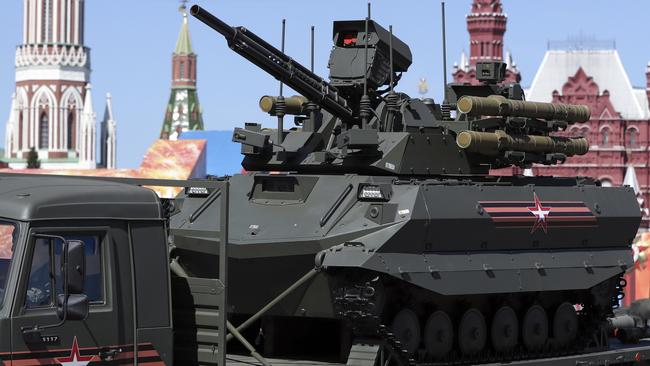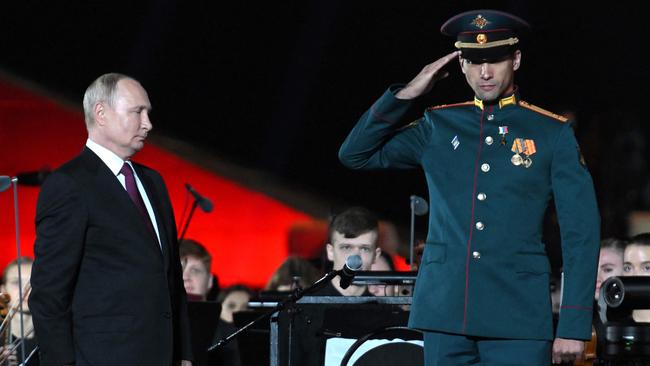Putin has retooled Russia’s economy to focus only on war
Some of Russia’s neighbours fear the success of Putin’s war machine now driving its economy means he will never make peace with Ukraine.

Russia’s successes on the front lines in Ukraine are a big reason why Vladimir Putin isn’t yet ready to sign up to President Trump’s peace efforts. Some of his neighbours fear the success of the war machine now driving its economy means he never will.
In the early stages of the war, the Russian president put the country on a footing for a long conflict. Mr Putin retooled the economy to churn out record numbers of tanks and howitzers, while using sizeable signing bonuses of up to a year’s salary to raise a massive army. At one point, more than a thousand recruits were signing up each day to fight.
This increase saved Moscow from the initial losses it suffered after failing to quickly capture Kyiv three years ago. Now it is helping Russian forces advance westward again, taking more than 160 square kilometres in the past month. The gains have given Mr Putin the latitude to slow walk peace negotiations and shrug off direct talks with his Ukrainian counterpart, Volodymyr Zelensky, despite growing European pressure and Mr Trump’s own exasperation with the lack of progress in ending the war.
But if or when Mr Putin is ready to make peace, unwinding his military build-up could prove a trickier task.
“It is absolutely imperative for Russia to continue to rely on the military industry, because it [has] become the driver of economic growth, ” said Alexander Kolyandr, a senior fellow at the Centre for European Policy Analysis. “For a while, it will be next to impossible for Russia to reduce military spending.”

Russia’s arms industry has enjoyed billions of dollars in stimulus in recent years to boost production lines and keep them running at breakneck speed 24 hours a day. The influx of cash has boosted wages – partly to compete with military payouts – and fuelled rising living standards for thousands of Russians in the country’s poorer backwaters.
“I’m not sure that Vladimir Putin himself has a strategy for how to unwind the war,” said US Vice President JD Vance after his meeting with Pope Leo XIV, speculating with reporters as to why Mr Putin hasn’t bitten on Mr Trump’s efforts to cease hostilities.
Mr Trump has grown increasingly willing to criticise Mr Putin for his refusal to end hostilities. Over the weekend he said in a social-media post that the Russian leader had gone crazy and told reporters “he’s killing a lot of people; I’m not happy about that.” On Tuesday Mr Trump expressed his frustration in another post.
“What Vladimir Putin doesn’t realise is that if it weren’t for me, lots of really bad things would have already happened to Russia, and I mean REALLY BAD. He’s playing with fire!” Mr Trump wrote.
If the war does end in Ukraine, some of Russia’s neighbours worry its war economy might be refocused on them.
In the Baltics, Estonian military planners grimly discuss the possibility of war spilling into NATO territory. In Kazakhstan, analysts carefully watch for signals that Russia could make a move into the north of the country, where a large ethnic Russian population still lives.
These fears stem partly from the belief that the Kremlin would rather keep the tens of thousands soldiers fighting on some other front line rather than bring battle-hardened and often traumatised men back home. After the end of World War II, Soviet leader Joseph Stalin viewed returning veterans as a threat and sent many to the gulags to rid himself of the domestic pressures they could cause.
Today, peace would likely see many of the hundreds of thousands of troops in Ukraine, particularly those who signed short-term contracts, demobilised and sent back to civilian life at a time of slowing economic and wage growth.
“It’s not going to be a good idea to cut those wages radically or in a very short time,” said Volodymyr Ishchenko, of the Free University of Berlin. “It’s not a good idea for the state to disappoint armed men.”
If the fighting in Ukraine ends, Russia’s military will still need men. The arms industry will still be building the guns and vehicles needed to replace the Soviet stockpiles lost on the front line, but at a slower pace than during the war. Job losses on factory lines, together with an increasingly stagnating economy, could stir some discontent among those who saw the war bring the biggest redistribution of wealth since the fall of the Soviet Union.
“Without an existential crisis like the war in Ukraine, it would be hard to justify continuing to pour money into the defence industry at the rate we already are,” said Ruslan Pukhov, head of the Moscow-based Centre for Analysis of Strategies and Technologies. “And Putin – even if they say he is an evil totalitarian – he is very sensitive about what people think and what they want.”
Already there are signs that the boost from the war and a surge in wages and living standards is beginning to level out. The declining price of oil adds another note of uncertainty for the future.
Some arms industries are exploring the idea of trying to export their extra production and return to Russia’s heyday as the second-largest arms exporter in the world, a position it held before the start of the war. But analysts say that is unlikely with an industry that has already lost market share in Asia and Africa, has a host of customers who depend on Russia for credit to buy the weapons and has given priority to quantity over quality.
In some ways, Russia finds itself in a situation similar to the US after World War II or Nazi Germany before the war – when their arms industries were the drivers of growth. But unlike the US, where military advances have spilt into the civilian sector – such as the mass production of penicillin or the internet – Russia’s defence industry is unlikely to produce technological breakthroughs to drive sustained growth.
Instead, while the civilian economy is suffering from a lack of manpower, causing price increases in eggs and potatoes, some see the shrinking of the arms industry as inevitable. The way that slowdown is managed will be crucial.
“When you reduce fiscal stimuli, you have to be very careful … there are so many people who are interested in keeping this merry-go-round going,” said Mr Kolyandr.
The Wall Street Journal





To join the conversation, please log in. Don't have an account? Register
Join the conversation, you are commenting as Logout